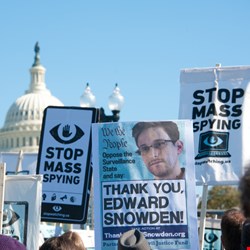
The British spy leaders, Sir John Sawyers (MI6), Andrew Parker (MI5) and Sir Iain Lobban (GCHQ) appeared before the Intelligence and Security Committee (ISC) of parliament. The stated purpose was to discuss current controversies, the work of the agencies, their conduct, the legal framework in which they operate, and their £2 billion budget. Snowden was not mentioned within this purpose; but his shadow appeared throughout the session.
"What I can tell you," said Sawyers (MI6) at one point, "is that the leaks from Snowden have been very damaging. They have put our operations at risk. It is clear that our adversaries are rubbing their hands with glee. Al-Qaeda is lapping it up and our own security has suffered as a consequence."
Asked to justify this statement with specifics, Sawyers said he would not do so in public, but would in private session.
Sir Menzies Campbell asked if the current legal framework governing surveillance is adequate. Lobban (GCHQ) replied, "It is an issue for politicians and not for us... If Parliament chooses to change the laws, so be it." Despite this response, the intelligence agencies had been very supportive of the government's earlier proposals in the Communications Bill (called by many the Snoopers' Charter) which would have explicitly made legal the collection of the mass communications meta data that Snowden has shown to be already happening.
Lobban also referred to, but adapted, the frequently used 'needle and haystack' analogy; that in order to find the needle, you must have the haystack to search. "If I have that haystack, I am looking for needles and fragments of needles. That is what my queries pull out. I do not look at the surrounding hay. It may have been intercepted. A small portion of that may apply to British citizens. We will not look at it without a specific authorization."
Meanwhile, in a speech at McGill University in Montreal, last Tuesday, Al Gore had also referred to the needle and haystack. Gore, however, commented, “When you are looking for a needle in a haystack, it’s not always wise to pile more hay on the haystack.” Gore's view of the surveillance regimes of the intelligence agencies (although he, of course, was referring specifically to the US agencies) is that the behavior is “outrageous” and “completely unacceptable.” And, “I say that as someone who was a member of the National Security Council working in the White House and getting daily briefings from the CIA,” he said.
But while Gore thinks the actions of of the agencies is disproportionate, the agencies take the exact opposite view. Parker (MI6) told the ISC, "The work we do is addressing directly threats to this country, to our way of life, to this country and to people who live here; and the work we do is proportionately judged against the necessity of protecting against those threats."
At around the same time as the spy leaders were talking, Sir Tim Berners-Lee, the inventor of the world wide web that is effectively synonymous with the internet, was talking to the Guardian. He, reported the Guardian, "has called for a 'full and frank public debate' over internet surveillance by the National Security Agency and its British counterpart, GCHQ."
He pointed out the contradiction in the government calling on the use of encryption to increase national security while simultaneously seeking to break and subvert it for their own use. "Berners-Lee also said it was a betrayal of the technology industry," reports the Guardian. "Any powerful agency needs checks and balances and, based on recent revelations, it seems the current system of checks and balances has failed," he said.